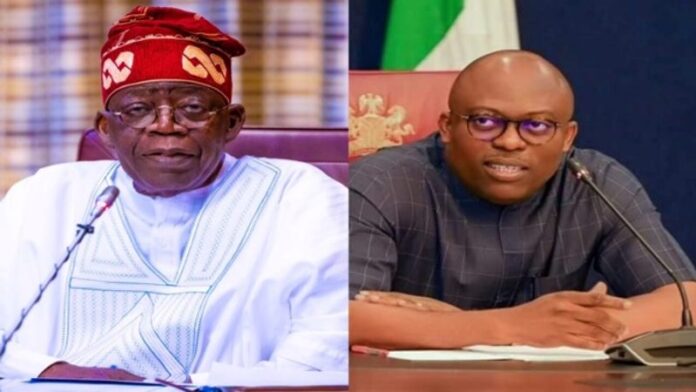Seven states under the control of the Peoples Democratic Party (PDP) have instituted a case at the Supreme Court, challenging the legality of the state of emergency declared in Rivers State and the six-month suspension of the governor, Mr Siminalayi Fubara by President Bola Tinubu
The governors of Bauchi, Adamawa, Bayelsa, Enugu, Osun, Plateau, and Zamfara states who initiated the action questioned the powers the president has to carry out such action (suspension).
The governors who termed the suspension as unconstitutional, through their attorneys general, urged the Supreme Court to declare that “the President has no powers whatsoever or authority to suspend a democratically elected governor and deputy governor of a state in the Federation of Nigeria under the guise of or pursuant to the proclamation of a state of emergency in any state of the federation, including the states represented by the plaintiffs,” based on the provisions of Sections 1(2), 5(2), and 305 of the 1999 Constitution (as amended).
The governors also prayed the apex court to declare that the President has no powers to suspend a democratically elected House of Assembly of a state pursuant to Sections 192 (4) (6) and 305 of the Constitution of the Federal Republic of Nigeria 1999 (as amended).
The appellants sought a declaration that “the suspension of Governor Siminalayi Fubara, his deputy, and members of the Rivers State House of Assembly was unconstitutional, unlawful, and in gross violation of the provisions of the 1999 Constitution (as amended).”
The governors argued that Tinubu lacks the statutory powers to suspend a serving governor and appoint a sole administrator in their stead.
They urged the apex court to nullify the appointment of the sole administrator appointed to govern the state.
They challenged the constitutionality of the voice votes used by the national assembly to ratify Tinubu’s actions.
They contended that the declaration of a state of emergency in Rivers State by the defendants did not comply with the constitutional requirements set out in Section 305 of the 1999 Constitution (as amended).
Furthermore, the litigants said the proclamation by the President failed to meet the stipulated conditions and procedures for such a declaration, stating that it was made for reasons beyond those specified in the Constitution.
They also argued that the national assembly’s approval of the state of emergency via a voice vote was invalid, stressing that the constitution mandates a two-thirds majority vote of members of each legislative chamber.
They prayed the Supreme Court for the following reliefs: “An order nullifying the proclamation of a state of emergency in Rivers State made by the first defendant and wrongfully approved by the second defendant;
“An order restraining the defendant, by himself, his servants, agents, and privies, from implementing the unlawful suspension of the governor and deputy governor of Rivers State;
“An order restraining the defendant, by himself, his servants, agents, and privies, from interfering in any manner whatsoever with the execution by the governor and deputy governor of Rivers State of their constitutional and statutory duties, as well as their electoral mandate; and
“An order restraining the defendant from attempting the suspension of any other governor of any state in Nigeria, particularly the plaintiffs, or from interfering with or undermining their constitutional and statutory duties.




























































